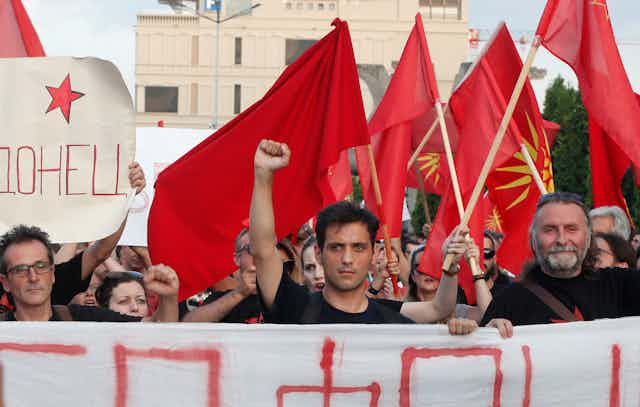The European Union has faced multiple policy crises during the first half 2022. These crises range from internal matters to the foreign policy quagmire that is Russia’s invasion of Ukraine.
The EU seeks to address these issues primarily through its continued expansion. Unfortunately for the EU, one of the 19th century’s foreign policy complications is threatening to undo this work. It’s known as the Macedonian Question.
The Macedonian Question — in essence, the debate over what constitutes Macedonian identity — was allegedly solved in 2019 with the Prespes Agreement between North Macedonia and Greece that ended the ongoing dispute between the countries.
Greek politicians claimed for decades that their northern neighbour, by calling itself Macedonia, was appropriating the legacy of Alexander the Great, which they consider part of their cultural heritage. In exchange for North Macedonia adding the word “north” to its name, Greece ended its diplomatic blockade against the country.
North Macedonia’s path to EU membership seemed assured until an old irritant in the Macedonian Question re-emerged: Bulgaria.

The role of Bulgaria
Greece may have ended its political embargo of North Macedonia, but it’s not the only country involved in the Macedonian Question. Since Bulgaria became a country in 1878, it has regarded ethnic Macedonians as Bulgarian. Nevertheless, when what became North Macedonia declared independence from Yugoslavia in 1991, relations between Macedonians and Bulgarians were, if not warm, at least functional.
The international community, in fact, frequently trumpeted Bulgaria’s approach to relations with North Macedonia as an example of how differences between neighbours can be resolved peacefully.
Unfortunately, Bulgaria was only able to take such a stance due to Greece’s refusal to recognize a Macedonian identity. So long as Greece, a member of the European Union, opposed North Macedonia’s entry into the EU, Bulgaria could pursue normal relations with the country because EU membership requires unanimity among its members. Once Greece and North Macedonia resolved their issues, however, Bulgaria lost its Greek shield.

After the Prespes Agreement, Bulgaria initially blocked North Macedonia’s progress towards EU membership unless it conceded that before 1944, its history was Bulgarian. Bulgaria’s president, known Russian sympathizer Rumen Radev, is at the forefront of these demands.
The EU has magnified Bulgaria’s refusal to budge on the issue. The president of France, Emmanuel Macron, inserted himself into the debate by proposing a solution that would require North Macedonia to change its constitution to recognize a Bulgarian minority within the country.
Macron’s suggestion, however, demonstrates a complete lack of knowledge regarding Macedonian affairs.

Rallying the Macedonian base
Of the 120 seats in the Macedonian Assembly, 44 are held by the Internal Macedonian Revolutionary Organization—Democratic Party for Macedonian National Unity (VMRO-DPMNE) and its allies.
VMRO-DPMNE has actively opposed prior agreements with Bulgaria, as well as the Prespes Agreement. It is unforeseeable that VMRO-DPMNE would accede to Macron’s proposal, and the party is using Bulgarian demands to rally its base.

While Macedonian nationalists form the basis of the resistance to the French proposal, they are not alone. North Macedonia has made substantial efforts to be accepted by the international community, reaching deals — including the Prespes Agreement — that other countries would probably not tolerate due to sovereignty concerns.
Frustration on the part of North Macedonians of all political stripes is reaching a boiling point. Unless the issue is resolved soon, the EU faces the real possibility of losing a potential member. In that case, it’s possible North Macedonia will turn to Russia.
This development could not occur at a worse time for the EU. The EU has sought to present a united front in the aftermath of Russia’s invasion of Ukraine.
Not only are EU leaders pressing for harmony among their fellow states — a challenging proposition in the best of times — but efforts are underway to accelerate the ascension of Europe’s non-EU states to the organization. Such moves, EU leaders hope, will help deter future Russian aggression.
Serbia serving as an example
Neighbouring Serbia demonstrates the potential problems of delaying EU ascension, and how Macron’s proposal could work against the organization’s interests.
Serbia, when it emerged from the rule of Slobodan Milosević and the disastrous wars of the 1990s, sought to join the EU as a means of economic recovery and a way forward. The process, however, has not been smooth, with constant delays on the part of the EU.

Serbian politicians, rightfully or wrongly, have viewed the EU as deliberately delaying their ascension. Now, as the EU seeks to unify the continent against Russia, Serbia is actively opposed to its efforts. Relations between Serbia and Russia, in fact, have improved since the start of the war.
Russia will likely leverage Serbian discontent against the EU. In Serbia, large-scale protests in favour of Russia demonstrate both the support that Russia has in the country, as well as resentment within Serbia over the EU’s treatment of their country.
Read more: Bosnia-Herzegovina could be the next site of Russian-fuelled conflict
There’s no guarantee North Macedonia will follow the same path as Serbia. The EU, however, is creating conditions that make such a development possible.
Self-inflicted wounds are not new to the EU — the history of the organization, in fact, is rife with them. But this wound in the midst of the Russia-Ukraine war only serves to benefit Russia in its efforts to undermine the EU.

